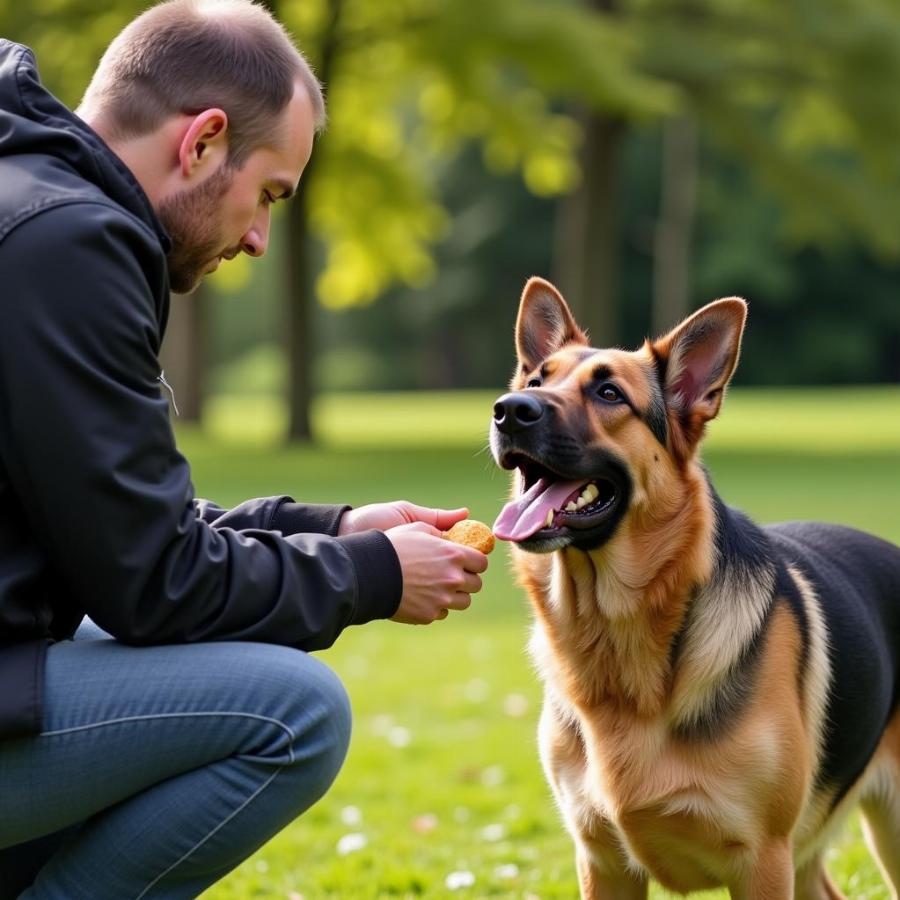A well-structured dog training schedule is crucial for raising a happy, well-behaved companion. Whether you’re bringing home a new puppy or teaching an old dog new tricks, a consistent dog training schedule helps establish clear expectations and fosters a strong bond between you and your furry friend. This comprehensive guide will provide you with everything you need to know about creating and implementing an effective dog training schedule, tailored to your dog’s individual needs and your lifestyle.
Why is a Dog Training Schedule Important?
Consistency is key when it comes to dog training. A regular dog training schedule helps your dog understand what is expected of them, leading to faster learning and better retention. It also helps to establish a routine, reducing anxiety and promoting a calm and predictable environment for your dog. Just like children thrive on routine, so do dogs. A dog training schedule provides structure and helps them feel secure.
Creating the Perfect Dog Training Schedule for Your Dog
There is no one-size-fits-all dog training schedule. The ideal schedule will vary depending on your dog’s age, breed, temperament, and the specific skills you’re trying to teach. However, there are some general guidelines to follow when creating a dog training schedule:
- Start Small: Begin with short training sessions, 5-10 minutes, several times a day. Puppies have shorter attention spans, so keep sessions brief and engaging.
- Be Consistent: Stick to the schedule as much as possible. Consistency helps your dog learn and reinforces the routine.
- Positive Reinforcement: Use positive reinforcement methods, such as treats, praise, and toys, to motivate your dog and make training a positive experience.
- Incorporate Training into Everyday Life: Don’t limit training to formal sessions. Incorporate training into everyday activities, such as mealtimes, walks, and playtime.
Sample Dog Training Schedule
Below is a sample dog training schedule that can be adapted to fit your dog’s needs. Remember, this is just a guide, and you should adjust it based on your dog’s individual progress and your lifestyle.
Puppy Training Schedule (8-16 weeks)
- Morning: Potty break, short play session, basic command training (sit, stay).
- Mid-day: Potty break, short walk, socialization.
- Afternoon: Potty break, play session, chew toy time.
- Evening: Potty break, short training session, quiet time before bed.
Adult Dog Training Schedule
- Morning: Potty break, long walk or run, training session (recall, leash manners).
- Mid-day: Potty break, short walk.
- Afternoon: Potty break, play session or interactive game.
- Evening: Potty break, training session (trick training), quiet time before bed.
 Chương trình huấn luyện chó trưởng thành
Chương trình huấn luyện chó trưởng thành
Addressing Common Dog Training Challenges
- Lack of Motivation: If your dog seems uninterested in training, try using higher-value treats or toys.
- Distractions: Minimize distractions during training sessions by choosing a quiet location.
- Consistency Issues: Set reminders on your phone or use a visual schedule to help you stay on track.
“A consistent training schedule is the foundation of a well-behaved dog,” says renowned dog trainer, Sarah Miller. “It provides clarity for the dog and builds a strong bond between owner and pet.”
How often should I train my dog?
Ideally, aim for short training sessions several times a day. Even 5-10 minutes of focused training can make a big difference.
Can I train my dog at any age?
Absolutely! While puppies are easier to train, dogs of any age can learn new skills with patience and consistency.
What if my dog isn’t responding to training?
Don’t get discouraged. Sometimes, adjusting your training methods or seeking professional help from a certified dog trainer can be beneficial.
“Remember that every dog is unique and learns at their own pace,” advises Dr. Emily Carter, a veterinarian specializing in animal behavior. “Patience and positive reinforcement are key to successful training.”
Conclusion
A well-planned dog training schedule is essential for raising a well-behaved and happy dog. By establishing a consistent routine, using positive reinforcement methods, and tailoring the schedule to your dog’s individual needs, you can achieve remarkable results. Remember to be patient and consistent, and enjoy the journey of building a stronger bond with your furry companion through dog training.
FAQs
- How long should dog training sessions be? Ideally, keep training sessions short, especially for puppies. 5-10 minutes is a good starting point.
- What are the best rewards for dog training? Positive reinforcement is key! Treats, praise, and favorite toys can all be effective motivators.
- When should I start training my puppy? You can start training your puppy as soon as you bring them home, focusing on potty training and basic commands.
- What if my dog has behavioral problems? Consult with a certified dog trainer or veterinarian behaviorist for guidance on addressing specific behavioral issues.
- How can I make dog training fun? Incorporate games and interactive activities into your training sessions to keep your dog engaged and motivated.
- How can I be consistent with my dog’s training schedule? Set reminders, use a visual schedule, or find a training buddy to help you stay on track.
- What are some common mistakes to avoid in dog training? Avoid using punishment, being inconsistent, and having unrealistic expectations.
Related Articles
You might also find these articles helpful: dog potty training schedule, what is simplicef for dogs, and ivermectin dose for dogs.
Beaut Dogs is your trusted source for all things dog-related, providing expert advice and resources to help you care for your canine companion. From breed information to training tips, we’re here to support you every step of the way. When you need expert guidance, email us at [email protected] for detailed and accurate answers. We are committed to providing reliable, helpful, and in-depth information about the world of dogs. Visit Beaut Dogs today to discover the wonderful world of dogs and learn how to care for them in the best possible way.